“I am a representative of a private military company,” announces a bald, broad-chested man, pacing amid a semi-rectangle of roughly 150 prisoners at Penal Colony No. 6 in the Republic of Mari El, located 400 miles east of Moscow.
Clad in a rugged tan jacket, gray fitted tactical pants, and black steel-toe boots, the man stalks the assembly like a stern patriarch.
“You have probably heard of it,” he studies the dull concrete before glancing up at his audience. Identically dressed in dark-colored BDUs, the inmates all stand at attention with hands firmly clasped in front of them.
“It’s called PMC Wagner.”
The man speaking is Yevgeny Prigozhin, a Russian oligarch and close confidant of Russian President Vladimir Putin.
Prigozhin makes his intent abundantly clear. The wealthy entrepreneur famously dubbed “Putin’s Chef” is providing the convicts with an opportunity to absolve their crimes and return to Russian society as free men. Provided, of course, they are willing to sign six-month contracts to fight in Ukraine as one of Prigozhin’s infamous mercenaries.
When a nearly five-minute video of his speech was “leaked” on September 14, most of the international media coverage focused on the fact that Russia was recruiting convicts for its ongoing war in Ukraine.
Largely lost in this feigned shock, this was also the first time Prigozhin had publicly confirmed his connection with Russia’s notorious private military company. Something that, in the past, the oligarch had gone to great lengths to obscure and flatly deny.
And yet, in recent weeks, not only has the Saint Petersburg businessman admitted he’s the mastermind behind Wagner PMC, Prigozhin has actively portrayed himself as a bastion of Russian military strength amidst Moscow’s beleaguered invasion of Ukraine, even going as far as openly criticizing Russia’s Ministry of Defense and “Russian elites.”
His sudden and unexpected entry into the limelight begs the question: “Just what is Yevgeny Prigozhin up to?” Most importantly, could all this gamesmanship suggest the Russian billionaire sees himself as a viable challenge to Russian President Vladimir Putin’s “Iron Throne?”
Russian experts tell The Debrief the latter is highly unlikely. However, “Putin’s Chef” is definitely up to something.
The lingering question is, what?
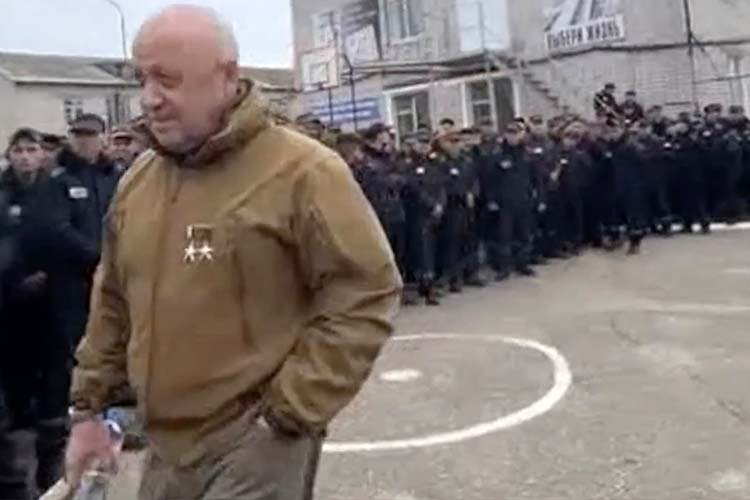

Who is “Putin’s Chef,” Yevgeny Prigozhin?
It’s unclear when Prigozhin gave his recruitment pitch. However, the subtle hints of affinity between the billionaire and his incarcerated audience were likely genuine.
Prigozhin spent nearly a decade in prison from 1981 to 1990. The oligarch has frequently engaged the Russian court system to shroud his criminal past. However, according to Russian court records published by the independent media outlet Meduza, Prigozhin’s stint in prison stemmed from charges of robbery and fraud.
Upon release from prison, Prigozhin and his stepfather set up a network of hot dog stands in St. Petersburg. According to him, soon “the rubles were piling up faster than his mother could count them in the kitchen of their modest apartment.”
Prigozhin used his food stand earnings to form the Concord Management and Consulting firm, investing in St. Petersburg’s first chain of grocery stores, “Contrast,” and opening several exclusive restaurants in the St. Petersburg area.
One of his dining establishments, created from a remodeled boat on the Vyatka River and aptly named “New Island,” became a chic dining spot for prominent businessmen and city and federal officials.
Reportedly, Prigozhin leveraged his success in the St. Petersburg business scene to connect with future influential members of Vladimir Putin’s inner circle, such as the current Director of Russia’s National Guard (Rosgvardiya) Viktor Zolotov.
And as Putin rose to power in the early 2000s, so did Prigozhin.
Through his Concord Catering business, the former convict has become one of Russia’s wealthiest and most influential men, allegedly receiving billions in government contracts, including a contract to supply meals to the Russian military.
Thanks to his commercial culinary past, coupled with having personally served Putin and France’s then-president Jacques Chirac when they dined at New Island in 2002, along with offering caviar and truffles to President George W. Bush during a summit in St. Petersburg in 2002, Western media has often mockingly referred to Prigozhin as “Putin’s Chef.”
The moniker of “chef” invokes images of Prigozhin, dressed in a tall, white, pleated hat, offering sage wisdom to Russia’s unmanageable leader while reminding him to eat his vegetables and at least try the Brussels sprouts.
According to Russia watchers and those who personally know him, this imagined image is an erroneous portrait of who “Putin’s Chef” really is.
As a former senior Russian defense official who worked with Prigozhin described him, “[He] is a person with no morals, no conscience, and no hobbies … He is a machine in the bad sense of the word.”
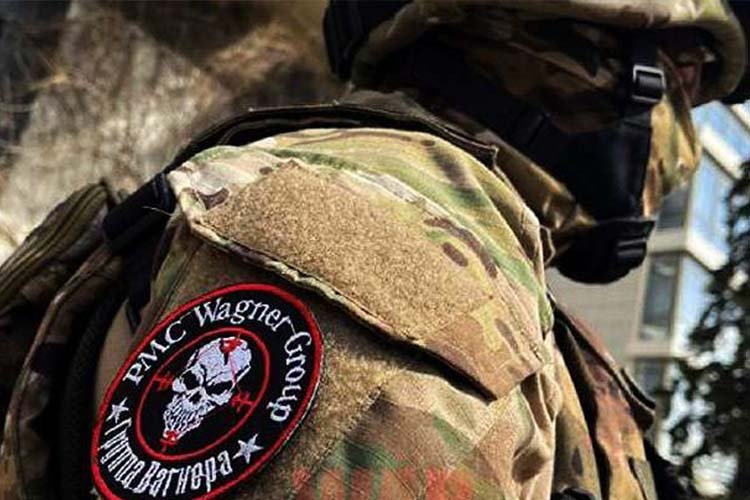

Prigozhin Raises a Powerful Shadow Army
As Putin began a campaign to expand Russia’s borders into eastern Ukraine and the Crimean peninsula in 2014, Yevgeny Prigozhin likewise branched out from his food service empire to establish Russia’s first and only known private military corporation: PMC Wagner.
According to Prigozhin, he formed Wagner in 2014 after being dissatisfied with the “cossacks and other paramilitary comrades” protecting the Russian population in Donbas from alleged Ukrainian “genocide.”
In a colorful statement issued by the Concord Catering Company on September 26, 2022, Prigozhin described how he personally formed the mercenary group by cleaning “old weapons,” dealing out body armor, and finding “specialists” who were willing to fight in eastern Ukraine.
“From this moment, on May 1, 2014, a group of patriots was born, which later acquired the name, PMC Wagner,” read Prigozhin’s statement, which was posted to the Russian social media outlet VKontakte. “Only thanks to their bravery and courage the liberation of Luhansk airport and many other territories became possible, and the fate of the LPR and the DPR changed radically.”
Officially, private military contractors are illegal under the Russian constitution, which restricts all matters of defense, security, and foreign policy for the state.
Wagner’s lack of legal status is a massive benefit for the Kremlin. It allows the private mercenaries to handle Russia’s dirty work while simultaneously giving Moscow an air of plausible deniability. Putin reiterated this point when asked about Wagner’s involvement in Ukraine during a joint press conference with French President Emmanual Macron in early February 2022.
“I have already made it clear that the Russian state has nothing to do with this. I am saying this quite responsibly without any hidden agenda,” said Putin. “Local authorities invite them at the state level, thank them for their work, and so on.”
In the past eight years, Wagner operatives have represented Russia’s interest in various global conflicts, including the civil wars in Syria, Libya, the Central African Republic (CAR), and Mali.
One consistent feature of Wagner is that claims of war crimes and human rights abuses invariably follow wherever it goes. Human rights organizations have accused Wagner mercenaries of murders, rapes, and robberies of civilians, in addition to acts of torture and the killing of three Russian journalists investigating the group in central Africa.
Prigozhin has denied allegations of wrongdoing by his mercenary group, saying the claims are the work of “every curious journalist and every shameless scumbag” who have “picked up [the] sweaty underwear of PMC Wagner in an attempt to find the negative.”
Wagner isn’t the only notorious venture Prigozhin is accused of masterminding.
The U.S. Department of Justice and Intelligence Community have alleged Prigozhin was the financial backer and director of the Internet Research Agency, a Russian-based “troll farm” engaged in online propaganda and social influence operations on behalf of Russian business and political interests.
Through professional “online trolls,” law enforcement officials say the Internet Research Agency has engaged in global disinformation campaigns, most notably as part of the Kremlin’s attempts to influence the 2016 U.S. Presidential election.
In 2018, Prigozhin was indicted by a federal grand jury on charges of conspiracy to interfere in the U.S. political system, and a federal warrant for his arrest was issued.
Currently, Prigozhin is on the FBI’s most wanted counterintelligence fugitives list, with a $250,000 reward for information leading to his arrest.
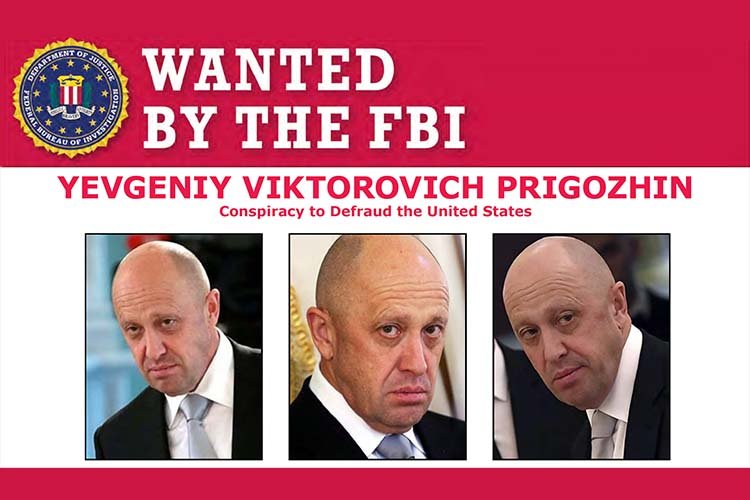

Out of the Shadows and Into the Limelight
For years, Prigozhin has denied any association or involvement with Wagner PMC. In fact, as recently as last year, Prigozhin was filing lawsuits against media outlets that had accused him of running the private mercenary group, and the oligarch was known for belittling journalists looking into his shadowy dealings.
However, all of this suddenly changed seven months into Russia’s invasion of Ukraine.
A day after the video showing “Putin’s Chef” recruiting prisoners was “leaked,” Prigozhin’s Concord company issued a bizarre statement neither confirming nor denying he was in the video.
“Indeed, we can confirm that the person in the video is monstrously similar to Yevgeny Viktorovich [Prigozhin],” the statement read. “Judging by his rhetoric, he somehow deals with the implementation of the tasks of the special operation, and it seems that he is successfully doing it.”
A little over a week later, Concord issued another statement offering a version of Wagner’s origin story and finally admitting Prigozhin was indeed the mercenary group’s boss.
“For a long time, I avoided the blows of many opponents with one main goal – not to frame these guys, who are the basis of Russian patriotism,” said Prigozhin.
Following his admission, Prigozhin has launched a devil-may-care publicity blitzkrieg, portraying himself as the brave, patriotic leader of Wagner PMC and the epitome of Russian military strength.
A stoic charcoal bust of Prigozhin emerging from plums of smoke, fighter jets, tanks, and balaclava-clad soldiers are now prominently featured on Wagner’s new recruiting posters. “Become part of the elite that defends Russia’s interests,” the sign reads.
Days after his prison recruiting video went public, the Wagner-affiliated Telegram channel Reverse Side of the Medal posted another brief video of Prigozhin. This time the oligarch took on the role of commander-in-chief, landing by helicopter in some remote locale under cover of darkness for a meeting with military commanders.
Additional images of a fatigue-clad Prigozhin apparently inspecting the frontlines have likewise trickled out from pro-Wagner outlets in recent weeks.
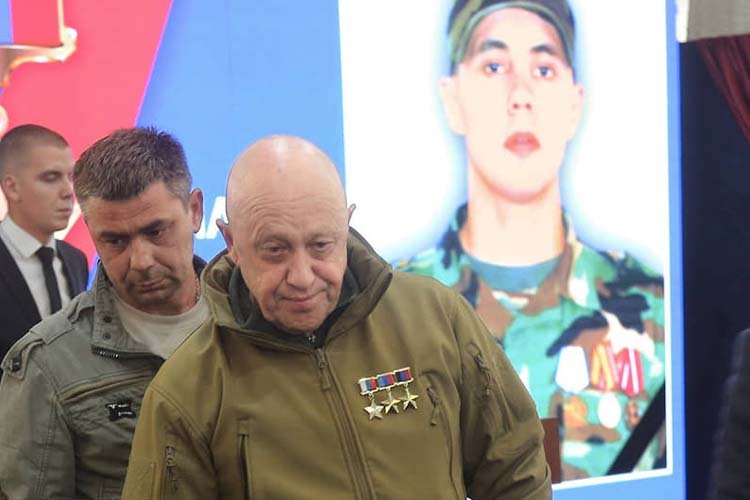

As Russia’s military has faced a stream of battlefield failures, Prigozhin has become an outspoken critic of the Russian Ministry of Defense and Moscow’s political elite. A stunning move that some have described as an “unprecedented rupture” within Russia’s ruling class.
When asked if Russian politicians and their children should be subject to the Kremlin’s September 21st mobilization order, Prigozhin answered with a resounding “Yes,” while mockingly saying that “at the same time, their tummies are thrown off.”
The oligarch added that his son volunteered for the Russian army at 18 years old before joining Wagner PMC, where he’d “constantly served in hot spots,” including Syria.
In an October 22 post on Telegram, Prigozhin said Russian society was divided into those who want to protect the Russian people and “enemy bureaucrats,” which he described as “representatives of the authorities and administrations of state structures at various levels who directly oppose the interests of the population.”
In September, after Ukraine launched a stunning counteroffensive, reclaiming swaths of territory in Kharkiv Oblast, Prigozhin was quick to make it clear that his Wagner mercenaries weren’t among the decimated Russian forces while openly criticizing Moscow’s military leadership.
Following Russia’s loss of the strategically important town of Lyman in the Donetsk region, Prigozhin suggested the man responsible for the city’s defense, central military district commander General Alexander Lapin, should be “shipped to the front barefoot with [a] machine gun.”
Since late August, Russian offensive operations have mostly halted, with troops assuming a defensive posture across the entire frontline stretching from Luhansk, Donetsk, Zaporizhzhia, and Kherson oblasts. The lone exception has been the area of Bakhmut, located roughly 36 miles north of occupied Donetsk, where Prigozhin’s Wagner group is en masse.
Through his various information channels, Prigozhin has touted Wagner’s continued onslaught on Bakhmut.
Following Russia’s loss of the strategically significant crossroads city of Izyum, military experts have called Wagner’s continued advances on Bakhmut “operationally irrelevant.” The consensus is that the battle for Bakhmut has become a political objective for Prigozhin, as capturing the city would at least represent a military victory while Russia’s regular armed forces are on the ropes.
Prigozhin has emphasized that his Wagner mercenaries are distinctly separate from Russia’s traditional armed forces or other proxy troops, such as those from the self-proclaimed “Donetsk People’s Republic” and “Luhansk People’s Republic.”
When recently asked if the Russian MoD helped provide equipment for Wagner soldiers, Prigozhin said the group was outfitted by “private funds from the nightstand, from my nightstand.” The oligarch also suggested his mercenaries didn’t need or want support from the Russian military. “Wagner almost always fights alone. It’s more reliable.”
Following Russian forces’ surrender of Izyum, Prigozhin said that amongst Wagner PMC, there was an “unspoken pact signed in blood with one’s battle-brothers” that Wagner soldiers do not surrender.
“If a fighter runs the risk of being captured for some inexplicable reason, for example, left alone on the battlefield without ammunition, wounded, and cannot fight the enemy, then he explodes on himself the very cherished grenade that is given to every PMC Wagner fighter,” said Prigozhin. “They call it that, ‘the last grenade.'”
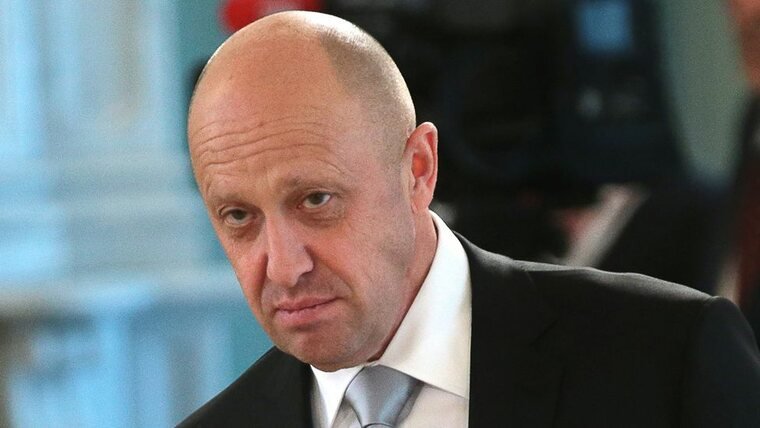

Has Prigozhin Become a Threat to the House of Putin?
Following the September 14 “leak” of his recruiting pitch at Penal Colony No. 6, the Institute for the Study of War (ISW) noted that Prigozhin was quickly being established as “the face of the Russian’ special military operation’ in Ukraine.”
Since then, Prigozhin has only elevated his appeal with Russia’s pro-war and nationalist communities, positioning himself as a bright star amongst a sea of Kremlin failures in Ukraine.
And with this sudden rise to fame, one cannot help but wonder, “Has ‘Putin’s Chef’ become a legitimate threat to the ‘House of Putin?'”
Speaking with The Debrief, Dr. Brian D. Taylor, a professor of political science specializing in Russian politics at Syracuse University and author of The Code of Putinism, said Prigozhin does appear to have a political agenda. However, it is doubtful he is eyeballing Putin’s throne.
“He clearly has become much more visible and much more upfront about who he is, what Wagner is, what their role in the war is,” said Dr. Taylor. “The whole story about him going to prisons to recruit fighters is pretty interesting, and it has led to some speculating about his ultimate political objectives.”
“However, I would say that if Prigozhin is angling for the top job, he’s delusional. Ultimately, he is someone who Putin created and allowed to rise to the position he’s in.”
Considering his founding of Wagner PMC and the Internet Research Corporation, some of Prigozhin’s newfound celebrity as a military leader likely stems from his well-established history as one of Russia’s more hawkish elites.
Dr. Taylor says Prigozhin’s open criticism of Russia’s military is likely fueled by a mix of business interest and political score-settling.
“Reporting out of Russia for years has been that he and Shoigu [Russian Defense Minister Sergei Shoigu] have not seen eye-to-eye, and the Ministry of Defense took away some of his contracts for catering for the military,” said Dr. Taylor. “I suspect he’s interested in getting those back, and I suspect that he wouldn’t feel sad if Sergei Shoigu was no longer Minister of Defense.”
Citing an unnamed former Russian defense official, The Guardian recently reported that Shoigu and Prigozhin have been at odds since the founding of Wagner in 2014. Purportedly, the rift was only exacerbated after Shoigu recently fired deputy defense minister Dmitry Bulgakov, who supposedly helped Prigozhin obtain some of his lucrative military contracts.
In early October, some pro-Wagner social media channels issued erroneous claims that Shoigu and Chief of Staff Valery Gerasimov had been forced out. Whether the claims were purposeful disinformation by the pro-Prigozhin camp or simply unsubstantiated rumors is up for speculation.
“I think to a certain extent, the sharks are circling, they see blood in the water because the war has been going so badly, and that’s why we’re seeing all this chatter,” said Dr. Taylor. “But ultimately, Putin makes these decisions. Putin has been quite close to Shoigu for a long time, and I don’t see him, at this point, deciding he’s going to throw him under the bus. I think he’s pretty loyal in that respect to the people he sees as his close associates.”
In his book, The Code of Putinism, Dr. Taylor details how Vladimir Putin has spent two decades methodically establishing a system of “hyper-presidentialism” that affords him near unlimited and uncontestable power. Thanks to this purpose-built autocracy, Dr. Taylor says that even as Russia’s military adventurism in Ukraine has so far been a disaster, it’s doubtful that anyone, much less Prigozhin, is currently a real threat to Putin.
“I get the impression that there’s lots of churn and unhappiness beneath the surface. However, it’s hard to see how any of that leads to something as bold as a conspiracy against Putin. For one, it would be very hard to put together because of the sort of hyper-presidential nature of things and because of who’s in what positions in the various security and law enforcement bodies,” explained Dr. Taylor.
“Even if people are unhappy, the tendency seems to be to keep their head down and try and protect their interests as best they can, but not say or do anything that would put their position at risk.”
Speaking on background, a member of the U.S. Intelligence Community told The Debrief they agreed that Putin being ousted in an “Et Tu, Brute?” scenario is incredibly unlikely right now. “In the low-probability chance it did happen, there’s also some concern within the IC about who could replace him,” said the intelligence official. “There are some in the Kremlin orbit who could end up being worse than Putin.”
“Honestly, I’m not sure how much worse it could get than launching the biggest war of territorial aggrandizement in Europe since the end of World War Two,” replied Dr. Taylor when asked about his concerns about Putin being replaced by some unforeseen hardliner like Prigozhin.
“There are obviously people around him who would probably be just as bad, but I don’t like this ‘boogeyman’ idea that after Putin, it’s going to get really bad.”
“I guess that’s possible, but it’s really freakin bad now.”
Tim McMillan is a retired law enforcement executive, investigative reporter and co-founder of The Debrief. His writing typically focuses on defense, national security, and the Intelligence Community. You can follow Tim on Twitter: @LtTimMcMillan. Tim can be reached by email: tim@thedebrief.org or through encrypted email: LtTimMcMillan@protonmail.com

